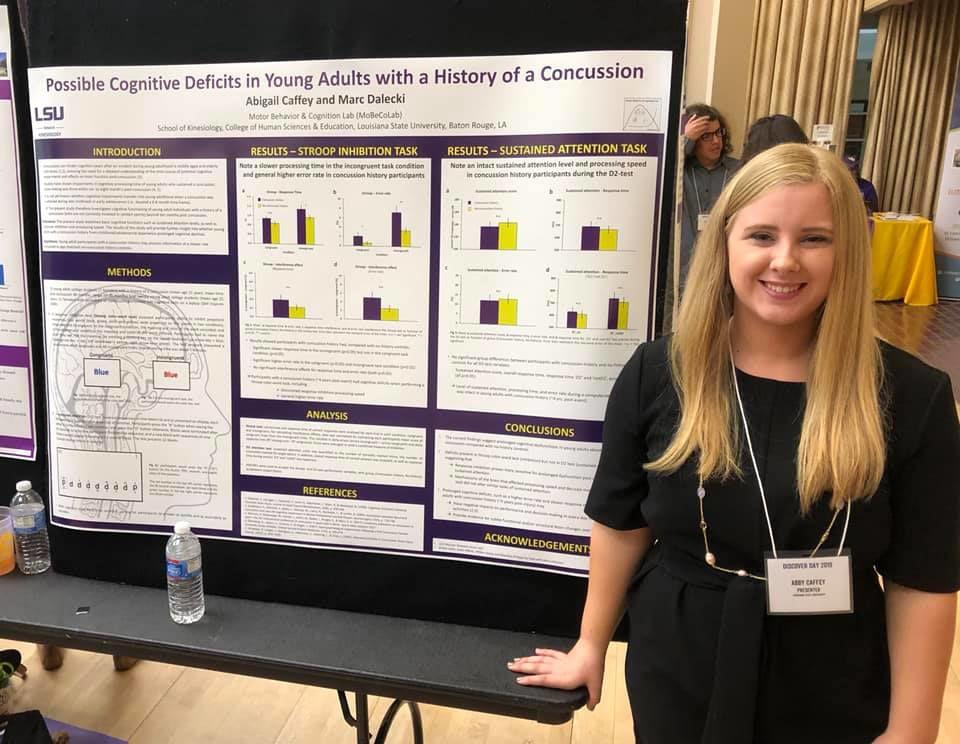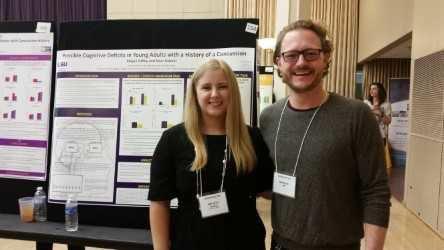Concussions are often thought of as a temporary condition that increases the possibility of certain ailments much later in life. But new research led by a University student and faculty adviser indicates that concussions may impair cognitive function for years after the injury.
Kinesiology senior Abby Caffey and assistant kinesiology professor Marc Dalecki are researching whether cognitive deficits from concussions sustained in late childhood or early adolescence carry over into young adulthood. Caffey said their work thus far shows that participants experience inhibited brain function for an average of four years after their concussion.
The University of Pittsburgh Medical Center’s Sports Medicine website states that between 1.7 to 3 million sports or recreation-related concussions occur yearly, and every five of 10 concussions go unreported or undetected.
“People with a concussion history have a significantly higher margin-of-error and a significantly slower response time than people who didn’t have a concussion history,” Caffey said.
Participants have an average of two concussions, Caffey said. To be included in the study, they had to have been diagnosed with a concussion by a doctor, and cannot play contact sports.
Caffey is able to conduct her research in part thanks to the LSU Discover Scholar grant she received right before this semester began. The grant awards up to 10 students $1,500 per semester to support their research, according to LSU Discover’s website. The Discover program also acts as a resource base with faculty advisers and research workshops open to all students.
To apply for the grant, Caffey had to submit a research proposal and budget summary and have a faculty mentor supporting her efforts.
Caffey said she first became interested in researching concussion effects because of a rare neurological disorder she suffers from called reflex sympathetic dystrophy. The New York State Department of Health’s website states that this disorder is characterized by severe burning pain usually affecting the arms, legs, feet or hands. No known cause exists for RSD, nor is there a cure.
“Not knowing why my body functions the way it does really sparked my curiosity in neurological function and cognition,” Caffey said.
The next step in Caffey’s research is to see how concussion-related effects change after four years, and if any difference in concussion effects exists between sexes. A long-term goal is to get MRI scans of participants brain activity at LSU Pennington Biomedical Research Center.
Unlike some research relationships where undergrads take on less meaningful roles, Caffey takes the lead on her area of research while Dalecki focuses on other areas. Caffey said she and Dalecki often go back-and-forth, with Caffey relaying her ideas and Dalecki offering advice on the feasibility and practicality of her suggestions.
Caffey said without Dalecki, her research would not be possible and she would never have gotten the grant.
Caffey recently presented her research at LSU Discover Day, a research showcase for Discover Scholars, where she and her colleagues won second place. She said she hopes to take her research to Chicago during the summer to present at a conference for the Society for Neuroscience.
LSU undergraduate receives Discover grant to research concussion effects
April 25, 2019
Kinesiology Senior Abby Caffey stands by her research presentation at LSU Discover Day on April 9th.
More to Discover











